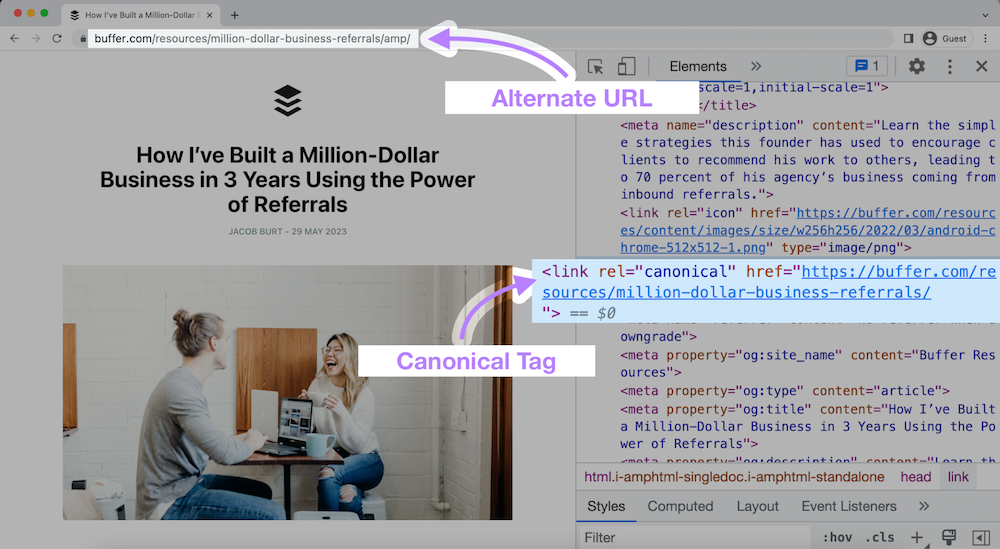What is Canonical URL
A canonical URL is the preferred version of a web page among multiple versions with similar or identical content, serving as a directive to search engines to consolidate indexing signals and attribute authority to the chosen canonical version, ultimately avoiding issues of duplicate content and ensuring a more accurate representation in search engine results.
Unraveling the Web’s Preferred Path
In the intricate tapestry of the internet, where countless pages vie for attention, the concept of canonical URLs emerges as a guiding force, ensuring clarity and order amidst the digital chaos. Canonical URLs play a crucial role in streamlining search engine indexing, consolidating content signals, and resolving the challenges of duplicate content. Join us on an insightful exploration as we delve into the importance, benefits, process overview, sample use cases, case studies, and strategies that underscore the significance of canonical URLs in shaping a website’s digital identity.
Process Overview: Orchestrating Canonical Harmony
Identification of Duplicate Content
- Identify instances of duplicate or highly similar content.
- Recognizing the need for canonicalization begins with pinpointing pages that share similar or identical information, creating a potential challenge for search engines.
Canonical Tag Implementation
- Implement canonical tags in the HTML of the preferred version.
- The canonical tag, placed within the head section of the HTML, signals to search engines that the current page is the preferred version and should be treated as the primary source.
Hreflang Tags for Multilingual Content
- Employ hreflang tags for multilingual content.
- When dealing with multilingual versions of a page, hreflang tags accompany canonical tags to inform search engines about language and regional targeting, ensuring the appropriate version is displayed to users.
Regular Monitoring and Updates
- Regularly monitor and update canonical tags.
- As website content evolves, it’s essential to review and update canonical tags accordingly to reflect changes in the preferred version of a page and maintain accuracy.
Sample Use Cases: Canonical URLs in Action
E-commerce Product Pages
- Objective: Optimize search results for similar product pages on an e-commerce site.
- Strategies: Implemented canonical tags for product pages with minor variations, guiding search engines to the primary product listing. Monitored and adjusted canonical tags based on product updates.
- Outcome: Users consistently found the primary product page in search results, leading to increased visibility and improved conversion rates.
News Articles with Multiple Views
- Objective: Ensure accurate search results for news articles with various viewing options.
- Strategies: Utilized canonical tags for news articles, specifying the preferred version. Employed hreflang tags for multilingual content. Regularly updated canonical tags based on user preferences.
- Outcome: Users received relevant news articles in their preferred language and format, leading to increased engagement and trust.
Blog Posts with Pagination
- Objective: Prevent duplicate content issues for blog posts with pagination.
- Strategies: Implemented canonical tags for each page of the blog post series, guiding search engines to the primary page. Regularly monitored and updated canonical tags as new blog posts were published.
- Outcome: The primary blog post page consistently ranked higher in search results, reducing the risk of users encountering duplicate content.
Case Studies: The Canonical Symphony
E-commerce Platform SEO Enhancement
- Challenge: An e-commerce platform faced challenges with similar product pages competing in search results.
- Strategies: Implemented canonical tags for product pages, consolidating authority and guiding search engines to the preferred versions. Conducted A/B testing to optimize tag effectiveness.
- Outcome: The e-commerce platform experienced improved search rankings, leading to increased organic traffic and conversions.
News Portal Global Reach Optimization
- Challenge: A news portal aimed to optimize global reach for its articles in various languages.
- Strategies: Utilized canonical and hreflang tags for news articles, ensuring the appropriate version was displayed based on user language preferences. Regularly updated tags to align with evolving user preferences.
- Outcome: The news portal achieved better visibility in search results across different regions, fostering a more diverse and engaged audience.
Corporate Website Content Consolidation
- Challenge: A corporate website faced challenges with duplicate content across its various product pages.
- Strategies: Implemented canonical tags for product pages, consolidating authority and guiding search engines to the primary pages. Regularly audited and updated tags to align with product updates.
- Outcome: The corporate website experienced improved search rankings, reduced bounce rates, and increased user engagement.

Importance
Objective: Canonical URLs serve as digital diplomats, guiding search engines to the preferred version of a web page and establishing a singular source of truth. Their importance lies in resolving issues of duplicate content and consolidating ranking signals, leading to more accurate search engine results.
Key Aspects:
Duplicate Content Mitigation
Canonical URLs mitigate the challenges of duplicate content.
By specifying the preferred version of a page, canonical tags help search engines understand the primary source, avoiding confusion and ensuring that the selected version receives due credit.
Consolidation of Ranking Signals
Canonical URLs consolidate ranking signals.
Instead of dispersing authority across multiple versions of a page, canonicalization channels ranking strength to the chosen canonical URL, enhancing its visibility and authority in search engine results.
Enhanced User Experience
Canonicalization contributes to an enhanced user experience.
Users encounter more accurate search results, reducing the likelihood of stumbling upon similar or identical pages and ensuring that the content they access aligns with their expectations.
Improved SEO Performance
Canonical URLs contribute to improved SEO performance.
By streamlining content signals and consolidating authority, canonicalization aids in achieving higher search engine rankings, ultimately driving more organic traffic to the preferred version of a page.

Your Business Benefits
SEO Efficiency
Canonical URLs enhance SEO efficiency.
By avoiding the dilution of ranking signals and concentrating authority, websites employing canonicalization enjoy more streamlined and impactful SEO strategies.
Search Engine Accuracy
Canonicalization ensures search engine accuracy.
Users receive more precise and relevant search results, fostering a positive user experience and contributing to increased trust in search engines.
Consolidated Analytics
Canonical URLs contribute to consolidated analytics.
Website administrators can more accurately measure the performance of the preferred version of a page, gaining insights into user engagement, conversions, and other key metrics.
Reduced Crawl Budget Consumption
Canonicalization reduces crawl budget consumption.
Search engine bots focus their crawling efforts on the preferred version of a page, optimizing crawl budget utilization and ensuring efficient indexing of critical content.
Your Business Strategies
Holistic Content Analysis
- Collaborate with DesignDiverso for holistic content analysis. Our approach ensures a comprehensive examination of content, identifying instances of duplication and formulating effective canonicalization strategies.
Precision in Tag Implementation
- Trust DesignDiverso for precision in tag implementation. Our experts meticulously implement canonical tags, ensuring accuracy and effectiveness in guiding search engines to the preferred version of your pages.
Multilingual Expertise with Hreflang Tags
- Rely on DesignDiverso for multilingual expertise. Our team adeptly employs hreflang tags for multilingual content, ensuring accurate targeting and display of the preferred versions to users across different languages and regions.
Regular Monitoring and Optimization
- Leverage DesignDiverso for regular monitoring and optimization. Our team conducts ongoing reviews of canonical tags, making necessary updates to align with evolving content strategies and user preferences.
DesignDiverso’s Symphony of Canonical Success
In the ever-evolving symphony of the internet, canonical URLs stand as conductors, orchestrating a harmonious digital experience. From e-commerce platforms to news portals, the sample use cases and case studies showcased the transformative impact of canonicalization on search engine results and user engagement.
DesignDiverso’s strategic approach to canonical URLs ensures that businesses and websites can navigate the digital landscape with precision and clarity. By collaborating with us, you unlock the true potential of canonicalization—a strategic tool that directs search engines to the preferred versions of your pages, enhancing visibility, authority, and user satisfaction. Embrace the symphony of canonical success, and let DesignDiverso be your guide to a more harmonious digital presence.

